| Srl | Item |
| 1 |
ID:
161519
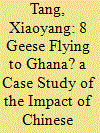

|
|
|
|
|
| Summary/Abstract |
China has significantly changed its engagement mode with Africa, shifting from trade of natural resources to investment in industrial sectors. This article uses Ghana as a case study to examine why and how Chinese investors come to set up factories in Africa’s challenging business environment. Through first-hand scoping study on the ground, the author reveals that the pressure of China’s industrial upgrading and the vast potential of Africa’s growing market are the main drives for Chinese manufacturers. Clustering and industrial zones proved to be effective instruments to help Chinese manufacturers grow in Ghana. The clustering of numerous small and medium-sized enterprises also facilitates linkage building between Chinese projects and the local economy. The ‘flying geese’ phenomenon is emerging in Ghana’s manufacturing sector, but the weak macro-economy and the lack of industrial supports largely slow down the progress of Chinese investments and reduce the spillover effects.
|
|
|
|
|
|
|
|
|
|
|
|
|
|
|
|
| 2 |
ID:
154421
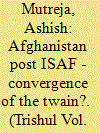

|
|
|
| 3 |
ID:
170658
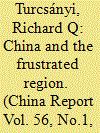

|
|
|
|
|
| Summary/Abstract |
Central and Eastern Europe (CEE) had few historical opportunities to interact with China, but with the Belt and Road Initiative (BRI) and the 16+1 platform, that changed dramatically in recent years. The article discusses recent development in the China-CEE relations with the aim of explaining why the CEE countries became excited about China initially, but also why this excitement led prevailingly to disappointment. It will be argued that the frustration with the EU in the aftermath of the 2008 crisis created an environment in which China was, for a moment, perceived as a promising alternative. A few years into the new diplomatic initiatives, however, most of the CEE countries started to be unsatisfied with the lack of economic results. Eventually, the article will assess the implications of the new era of China-CEE relations for the EU affairs and broader Chinese relations with the developing world. The CEE region is in a specific position vis-à-vis China, for it is structurally in between the developed and the developing world. Moreover, the EU membership adds some critical features which make the Chinese offer less applicable and appealing.
|
|
|
|
|
|
|
|
|
|
|
|
|
|
|
|
| 4 |
ID:
183366
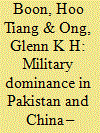

|
|
|
|
|
| Summary/Abstract |
The China–Pakistan Economic Corridor (CPEC) has been touted as the centrepiece of China’s Belt and Road Initiative and the key to its strategic partnership with Pakistan. Notwithstanding claims about the CPEC’s economic potential, however, Islamabad’s economy continues to be dire. This article attempts to better understand the ramifications of Pakistan’s economic viability and its consequences for China. It does so by examining China–Pakistan relations from the lens of Pakistan’s civil–military relations, paying attention in particular to what the Pakistan Armed Forces (PMA)’s domestic dominance means for China’s interests, including economic interests, in Pakistan. We suggest that PMA preponderance and its attendant influence on the country’s economic performance bring another dimension to interpreting Sino-Pakistani relations. As Beijing’s most trusted political partner in Pakistan, the PMA’s local dominance has considerable benefits for China, particularly in the security and political aspects of its interests. However, this dominance also entails a number of complications for Chinese economic interests, a factor that has implications for the future of China’s CPEC investments and their financial sustainability.
|
|
|
|
|
|
|
|
|
|
|
|
|
|
|
|
| 5 |
ID:
185554
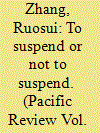

|
|
|
|
|
| Summary/Abstract |
This article investigates three Chinese multibillion overseas investment projects in Myanmar—the Myitsone dam, the Letpadaung copper mine, and the Sino-Myanmar oil and gas pipelines—over the course of three consecutive Myanmar governments. It explains why these mega-projects obtained varying degrees of success in terms of their completion and operation status and why only the dam project was unilaterally suspended following Myanmar’s controlled and peaceful power transition in 2011. Through a structured and focused comparison, this article argues that the “people’s will” is not the reason why President Thein Sein halted the Myitsone dam project, despite his claims and contrary to much scholarly research on this case. Rather, the cost-benefit calculations of Myanmar government, in particular how it weighed the urgency of national security against other costs and benefits such as appeasing or failing the domestic opposition, determine the varying degrees of success both over time and across projects. This article draws implications for the completion and operation status of Chinese overseas investment projects around the globe.
|
|
|
|
|
|
|
|
|
|
|
|
|
|
|
|
| 6 |
ID:
106542
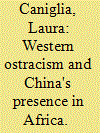

|
|
|
|
|
| Publication |
2011.
|
| Summary/Abstract |
Viewed within the context of China's history, development, and present conditions on the one hand and the geopolitical and economic situation on the other hand, this article argues that China's increased presence in Africa is the result of China seizing opportunities which arose in the wake of ostracism by major developed countries in their response to Chinese acquisitions in the energy field, rather than a carefully planned policy programme on the part of the Chinese. The consequence of China turning its attention to Africa to gain access to natural resources has been an increase in overall Chinese investments, as the central government has come to realize the full potential of Africa as a business partner.
|
|
|
|
|
|
|
|
|
|
|
|
|
|
|
|